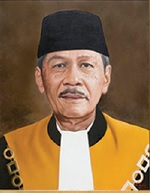
The chief justice of the United States is the chief judge of the Supreme Court of the United States and the highest-ranking officer of the U.S. federal judiciary. Article II,Section 2,Clause 2 of the U.S. Constitution grants plenary power to the president of the United States to nominate,and with the advice and consent of the United States Senate,appoint "Judges of the supreme Court",who serve until they resign,retire,are impeached and convicted,or die. The existence of a chief justice is explicit in Article One,Section 3,Clause 6 which states that the chief justice shall preside on the impeachment trial of the president.

The Supreme Court of the Republic of Indonesia is the independent judicial arm of the state. It maintains a system of courts and sits above the other courts and is the final court of appeal. It can also re-examine cases if new evidence emerges.

Marvic Mario VictorFamorca Leonen is the Senior Associate Justice of the Supreme Court of the Philippines since May 14,2022 upon the retirement of Senior Associate Justice Estela Perlas-Bernabe. He became an Associate Justice of the Supreme Court on November 21,2012 –the second youngest to hold the said position since Manuel V. Moran in 1938. Prior to his stint in the country's highest court,he served as chief peace negotiator of the Republic of the Philippines in peace talks with the Moro Islamic Liberation Front.

The Constitutional Court of the Republic of Indonesia is one of the apex courts in Indonesia along with the Indonesian Supreme Court. Its primary role is reviewing the constitutionality of statutes (undang-undang). It also has other functions,including resolving disputes over the powers of state institutions,settling disputes over the results of general elections,deciding on the dissolution of political parties,and supervising impeachment. The last two functions have never been exercised by the Court.

The Judicial Commission of Indonesia was established as a consequence of the third amendment to the Constitution of Indonesia ratified by the Indonesian People's Consultative Assembly on 9 November 2001. The Commission's duty is to monitor the performance of judges,advise the House of Representatives on judicial appointments and review community complaints about the behavior and fairness of presiding judges.

Patrialis Akbar is an advocate and politician who was member of the Constitutional Court Justice of the Indonesian Constitutional Court for the period 2013-2017 from Padang,West Sumatra. He has a complete career in three branches of state,legislative,executive and judicial power. He had served as a member of the House of Representatives for two periods.
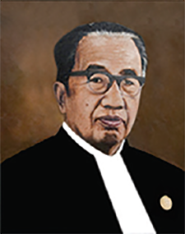
Wirjono Prodjodikoro was the head justice of the Indonesian Supreme Court from 1952 to 1966.

Dr. Sahardjo LL.B.,was a National Hero and Minister of Justice of Indonesia during the First,Second,and Third Working Cabinets.

Sulaiman Effendi Kusumah Atmaja was an Indonesian judge and national hero who served as the first chief justice of the Supreme Court of Indonesia from August 1945 until August 1952. He was born to a noble ethnic-Sundanese family in Purwakarta,and obtained a law diploma from the Rechtschool in 1913. In 1919,he worked as a court clerk in Bandung,before leaving that job to continue his legal education at Leiden University. After graduating from Leiden in 1922,he returned to the East Indies,and became a judge in Batavia and later Indramayu.

Adnan Buyung Nasution,also known as Adnan Bahrum Nasution was an Indonesian lawyer,advocate,and activist.
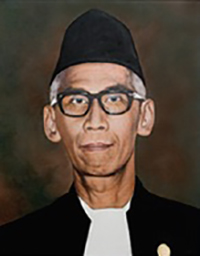
Suryadi was a former Chief Justice of the Supreme Court of Indonesia,as well as the first chairman of the Indonesian Judges Association.
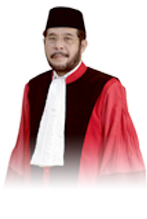
The chief justice of the Constitutional Court of Indonesia is the head of the Constitutional Court of Indonesia.
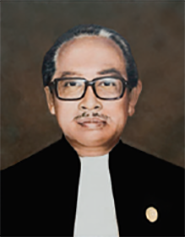
Subekti (1914-1992) was the fourth Chief Justice of the Supreme Court of Indonesia.
Umar Seno Aji (1915–1984) was the fifth Chief Justice of the Supreme Court of Indonesia as well as the fourteenth Indonesian Minister of Law and Human Rights.

Mujono (1927–1984) was the sixth Chief Justice of the Supreme Court of Indonesia as well as the 16th Minister of Law and Human Rights. His appointment to both posts began a line of former military officials predominating in Indonesia's legal system.

Ali Said (1927-1996) was an Indonesian judge,military officer and politician. Like his predecessor Mujono,he was one of a string of former military officials to be appointed to the judiciary of Indonesia.
The Indonesian Judges Association,known locally as Ikatan Hakim Indonesia or IKAHI is an association of judicial officials in Indonesia. IKAHI's members include first-level trial judges and senior justices,as opposed to the Indonesian Judges' Forum (FDHI) which includes appeals court judges. IKAHI executive Suhadi has described the association's focus as protection of judges from threats and harassment,though judicial transparency activists have disputed this.

Purwoto Gandasubrata was the eighth Chief Justice of the Supreme Court of Indonesia. Alongside the Ministry of Justice officials in the Sixth Development Cabinet,Gandasubrata was a part of a general return of civilian officials to the judiciary of Indonesia in the early 1990s after a period of former military officials dominating the branch from the late 1970s. Gandasubrata had initially served as the chief of the district court of Semarang,as well as the chairman of the regional branch of the Indonesian Judges Association.

Suryono,also spelled Soerjono,was the ninth Chief Justice of the Supreme Court of Indonesia. The reputation of the Supreme Court among legal scholars suffered under his tenure due to Suryono's tendency to reverse seemingly final decisions via what were derisively termed "magic memos," and he was generally regarded as a candidate who would maintain the Supreme Court's subordination to the executive branch. He overturned an administrative court ruling that had lifted a New Order-era ban on Tempo,a popular political commentary magazine.

Adi Andojo Soetjipto was an Indonesian jurist and lecturer who served as an associate justice of the Supreme Court of Indonesia from 1981 until his retirement in 1997. Soetjipto was nominated twice for the position by the People's Representative Council in 1979 and 1980 and was installed in 1981. He was known for exposing bribery and collusion inside the Supreme Court and his criticism of the Supreme Court.
